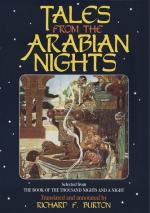[FN#294] “Ibraa” = deliverance from captivity, etc. Ya = i, and Mim = m, composing the word “Ibrahim.” The guttural is concealed in the Hamzah of Ibraa, a good illustration of Dr. Steingass’s valuable remarks in Terminal Essay, pp. 235, 236.
[FN#295] “Kalim” = one who speaks with another, a familiar. Moses’ title is Kalimu’llah on account of the Oral Law and certain conversations at Mount Sinai.
[FN#296] In text “Istifa” = choice, selection: hence Mustafa = the Chosen Prophet, Mohammcd; vols i. 7; ii. 40.
[FN#297] In text “Jazr” = cutting, strengthening, flow (of tide).
[FN#298] In the text “Nafishah” Pers. “Nafah,” derived, I presume, from “Naf” = belly or testicle, the part which in the musk-deer was supposed to store up the perfume.
[FN#299] For ’Nahavand,” the celebrated site in Al-Irak where the Persians sustained their final defeat at the hands of the Arabs A.H. 21. It is also one of the many musical measures, like the Ispahani, the Rasti, the Rayhani, the Busalik, the Nava, etc., borrowed from the conquered ’Ajami.
[FN#300] This second half of the story is laid upon the lines of “The Man of Al-Yaman and his six Slave-girls”: vol. iv. 245.
[FN#301] This history again belongs to the class termed “Abtar = tailless. In the text we find for all termination, “After this he (Yusuf) invited Mohammed ibn Ibrahim to lie that night in the palace.” Scott (vi. 364) ends after his own fashion:—“They (the ten girls) recited extempore verses before the caliph, but the subject of each was so expressive of their wish to return to their beloved sovereign, and delivered in so affecting a manner, that Mamoon, though delighted with their wit and beauty, sacrificed his own pleasure to their feelings, and sent them back to Eusuff by the officer who carried the edict, confirming him in his dominions, where the prince of Sind and the fair Aleefa continued long, amid a nnmerous progeny, to live the protectors of their happy subjects.”
[FN#302] This tale is headless as the last is tailless. We must suppose that soon after Mohammed ibn Ibrahim had quitted the Caliph, taking away the ten charmers, Al-Maamun felt his “breast straitened” and called for a story upon one of his Rawis named Ibn Ahyam. This name is repeated in the text and cannot be a clerical error for Ibn Ibrahim.
[FN#303] Scott (vi. 366) “Adventures of the Three Princes, sons of the Sultan of China.”
[FN#304] In the text “’Ajam,” for which see vol. i. 2, 120. Al-Irak, I may observe, was the head-quarters of the extensive and dangerous Kh rijite heresy; and like Syria has ever a bad name amongst orthodox Moslems.




